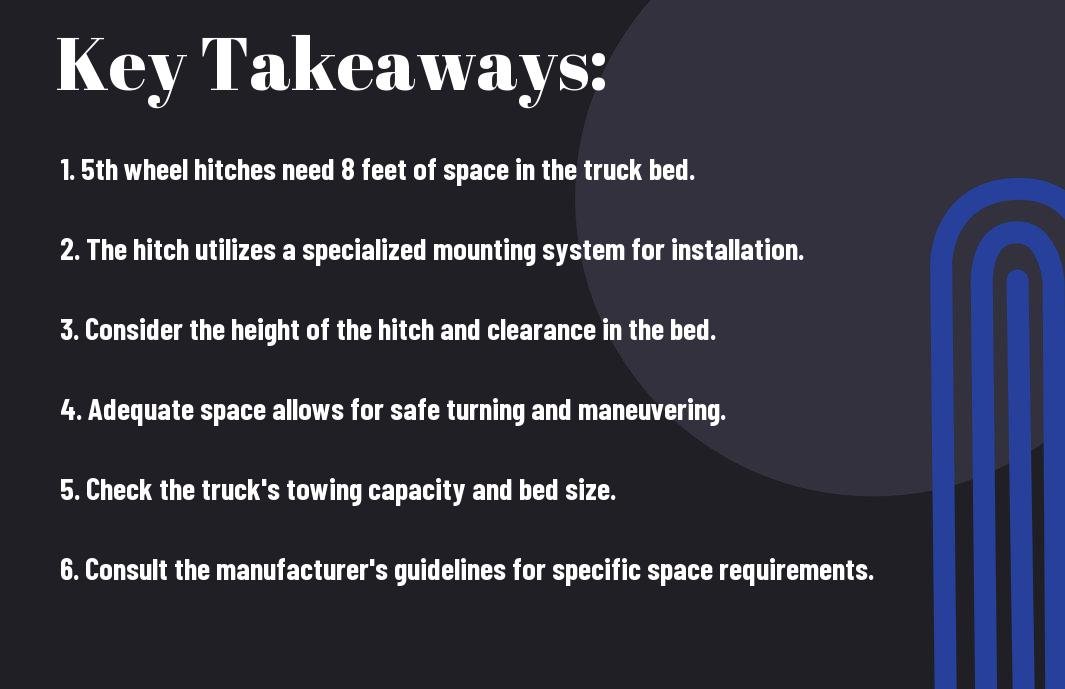Have you ever wondered how much clearance space is needed for a 5th wheel hitch? Whether you’re considering purchasing a 5th wheel trailer or already have one, it’s important to understand the space requirements for this type of hitch. It’s essential to ensure that you have adequate clearance for safe and efficient towing. The 5th wheel hitch typically requires a bed length of at least 6.5 feet in order to properly accommodate the hitch and trailer. Additionally, you’ll want to take into consideration the clearance needed between the front of the trailer and the rear of the cab of your truck. Failure to provide enough space can result in dangerous situations such as jackknifing or even damage to your vehicle or trailer. By understanding the spatial requirements of a 5th wheel hitch, you can ensure a safe and enjoyable towing experience.
Key Takeaways:
- Space Consideration: A 5th wheel hitch requires around 3 feet of bed space for proper installation and operation.
- Bed Length: The length of the bed in the truck will determine the amount of space available for the 5th wheel hitch.
- Truck Size: Larger trucks with longer beds will provide more space for a 5th wheel hitch compared to smaller trucks with shorter beds.
- Turning Radius: The 5th wheel hitch needs ample space for the truck to make sharp turns without damaging the hitch or truck.
- Installation Requirements: Proper installation of the 5th wheel hitch will ensure that it has enough space to operate safely and effectively.
- Clearance for Maneuvering: Adequate space around the hitch is essential for easy maneuvering and backing up the trailer.
- Consult Manufacturer’s Guide: Always refer to the manufacturer’s specifications for the 5th wheel hitch to determine the exact space requirements for your specific model.

Hitch Components and Space Requirements
One of the most important considerations when it comes to 5th wheel hitches is the amount of space they require. Understanding the components of the hitch and how they fit into your truck bed is crucial to ensure safe and proper installation. Let’s take a look at the main components and their space requirements.
Main Hitch Assembly
When it comes to the main hitch assembly, the most critical component is the hitch itself. This is the part that attaches to the pin box on the 5th wheel trailer and sits in the bed of your truck. The hitch usually requires a significant amount of space in the truck bed, and you’ll need to ensure that there is enough room for it to function properly. Incorrect installation or insufficient space could result in unsafe towing conditions. The hitch also needs to be securely mounted to the bed of your truck to prevent it from shifting during travel.
Mounting Rails and Brackets
The mounting rails and brackets are another crucial component of the 5th wheel hitch system. These parts are installed in the bed of your truck and provide the foundation for the hitch assembly. It’s important to ensure that these mounting rails and brackets are installed correctly and securely, as they bear the weight of the hitch and the trailer. Proper installation of the mounting rails and brackets is essential for safe and stable towing. Additionally, the space required for these components needs to be taken into account when planning for the installation of a 5th wheel hitch.
By understanding the space requirements and components of a 5th wheel hitch, you can ensure that your hitch is properly installed for safe and confident towing. It’s crucial to pay attention to these details to prevent dangerous towing conditions and ensure a positive towing experience.
Factors Influencing Space Needs
Keep in mind that the space requirements for a 5th wheel hitch can vary based on a number of factors. Here are some of the key elements that will influence the amount of space you need:
- Truck bed length and width
- Type of 5th wheel trailer
- Hitch design and placement
After considering all of these factors, you can make an informed decision about the amount of space needed for your specific setup.
Truck Bed Length and Width
When it comes to the space needed for a 5th wheel hitch, the size of your truck bed plays a crucial role. A longer truck bed allows for a larger turning radius, giving you more flexibility in maneuvering the trailer. Additionally, a wider bed provides more stability for the hitch and trailer connection. However, it’s important to note that a longer bed may limit the maneuverability of your truck in tight spaces. You’ll need to consider the trade-offs when determining the right amount of space for your setup.
Type of 5th Wheel Trailer
The type of 5th wheel trailer you plan to tow also influences the space needed for the hitch. Larger, heavier trailers require a more robust hitch and may need additional space for clearance during tight turns. In contrast, smaller trailers have different space requirements. You need to ensure that the space available in your truck bed is compatible with the specific type of 5th wheel trailer you plan to tow. This will ensure safe and efficient towing without sacrificing maneuverability.
Installation and Clearance Concerns
Despite the convenience and stability of 5th wheel hitches, there are some installation and clearance concerns you need to be aware of before hooking up your trailer. Proper installation of the hitch is crucial for the safety and efficiency of your towing experience. Additionally, ensuring the appropriate clearance for the hitch and the trailer during turns and height adjustments is essential.
Turning Radius and Tailgate Clearance
When installing a 5th wheel hitch, it is important to consider the turning radius and tailgate clearance of your truck. The turning radius of your truck, combined with the length of the trailer, will determine how sharp of a turn you can make without the trailer hitting the cab of the truck. Ensuring adequate clearance between the tailgate and the front of the trailer when making tight turns is also crucial to prevent damage to your truck or trailer. This can be achieved by adjusting the hitch position and choosing a compatible trailer for your truck.
Height Adjustments for Safe Towing
Another important consideration when installing a 5th wheel hitch is the height adjustment for safe towing. The height of the hitch needs to be properly adjusted based on the height of your truck and the trailer to ensure level towing and stability on the road. Failing to make the necessary height adjustments can result in unsafe towing conditions, which can lead to loss of control or damage to your vehicle. Ensure that the hitch is installed at the appropriate height according to the specifications provided by the manufacturer of your truck and the trailer.
Before hitting the road, it is important to thoroughly inspect the installation of your 5th wheel hitch and address any clearance concerns. Follow the manufacturer’s guidelines and recommendations for proper installation to ensure a safe and enjoyable towing experience. Taking the time to address installation and clearance concerns will prevent potential accidents and damage to your vehicle, allowing you to tow your trailer with peace of mind.
Practical Tips for Optimizing Hitch Space
For optimal efficiency when it comes to utilizing your 5th wheel hitch space, here are some practical tips to consider:
- Plan and organize your cargo effectively to make the most of the available space.
- Invest in compact and versatile storage solutions to maximize the use of space without compromising on safety.
- Regularly inspect and maintain your hitch and trailer to ensure that the available space is not compromised by any obstructions or damages.
Perceiving and implementing these tips will help you make the most of the available hitch space while ensuring safe and efficient towing.
Techniques for Measuring Available Space
When determining the available space for your 5th wheel hitch, it’s essential to accurately measure the dimensions of both your vehicle’s hitch and the trailer. Use a measuring tape to measure the clearance from the bed of your truck to the underside of the trailer overhang. This will provide you with a clear understanding of the vertical space available for the hitch. Additionally, measure the width of the hitch to ensure it can accommodate the necessary equipment without any issues.
Recommendations for Compact Hitches
When it comes to selecting a 5th wheel hitch, consider investing in a compact model that is designed to optimize space without compromising on towing capacity or safety. Look for hitches with a sleek and ergonomic design that allows for efficient use of space without protruding or obstructing the bed of your truck. Compact hitches can provide you with the space-saving solution you need while maintaining the necessary stability and strength required for safe towing.
Conclusion
With this in mind, you should be aware that a 5th wheel hitch typically requires at least 36 inches of space between the cab of your truck and the front of the trailer. This is important to ensure proper maneuverability and safety when towing your 5th wheel trailer. Additionally, you will also need to consider the height of the hitch and make sure it is compatible with the bed of your truck. Always consult your owner’s manual and the manufacturer’s specifications to ensure you have the appropriate amount of space for your specific 5th wheel hitch. By carefully considering these factors, you can ensure a safe and successful towing experience with your 5th wheel trailer.
FAQ
Q: How much room does a 5th wheel hitch need?
A: The amount of room needed for a 5th wheel hitch depends on the specific model and design. Generally, a 5th wheel hitch requires at least 36 to 40 inches of space between the cab of the truck and the front of the trailer. It’s important to consult the manufacturer’s guidelines for your specific hitch to ensure proper clearance.
Q: Can I install a 5th wheel hitch on any truck?
A: While many trucks can be equipped with a 5th wheel hitch, it’s essential to ensure that your truck is compatible with the specific hitch model you are considering. Factors such as the truck’s weight rating, bed size, and installation requirements should be carefully considered before installing a 5th wheel hitch.
Q: What are the weight ratings for 5th wheel hitches?
A: 5th wheel hitches come with weight ratings that indicate the maximum amount of weight they can safely handle. These weight ratings typically range from 16,000 to 30,000 pounds, depending on the hitch model. It’s crucial to select a hitch with a weight rating that matches or exceeds the weight of your trailer to ensure safe towing.
Q: What is the installation process for a 5th wheel hitch?
A: Installing a 5th wheel hitch typically requires securing the hitch to the truck’s bed using mounting brackets and hardware. The installation process may also involve making adjustments to the truck’s suspension and frame to accommodate the hitch. Proper installation is crucial for safe and secure towing, so it’s recommended to have the hitch professionally installed or carefully follow the manufacturer’s instructions.
Q: Are there any special considerations for towing with a 5th wheel hitch?
A: When towing with a 5th wheel hitch, it’s essential to consider factors such as weight distribution, braking systems, and turning radius. Proper weight distribution and quality trailer brake systems are critical for safe towing. Additionally, the unique pivot point of a 5th wheel hitch requires understanding and adjusting to different turning and maneuvering techniques compared to traditional trailer towing.
